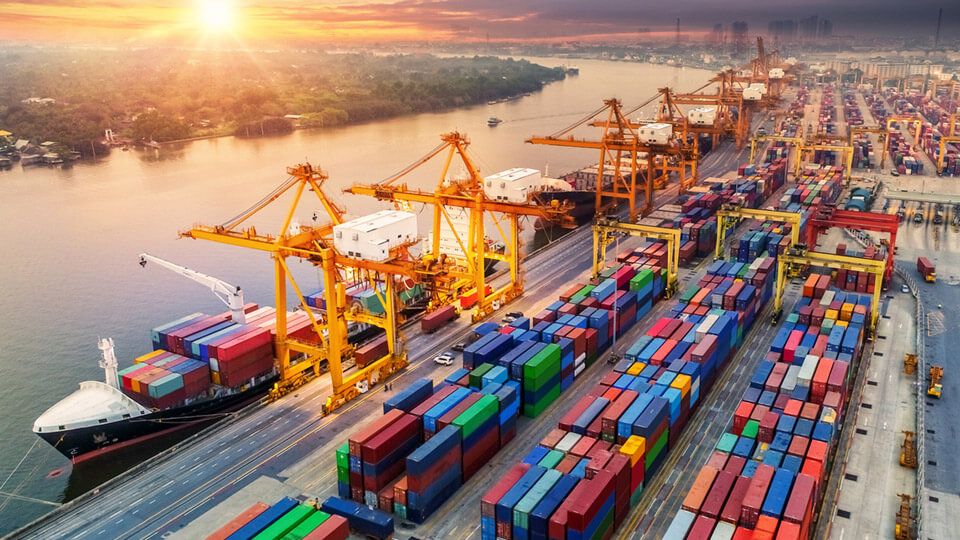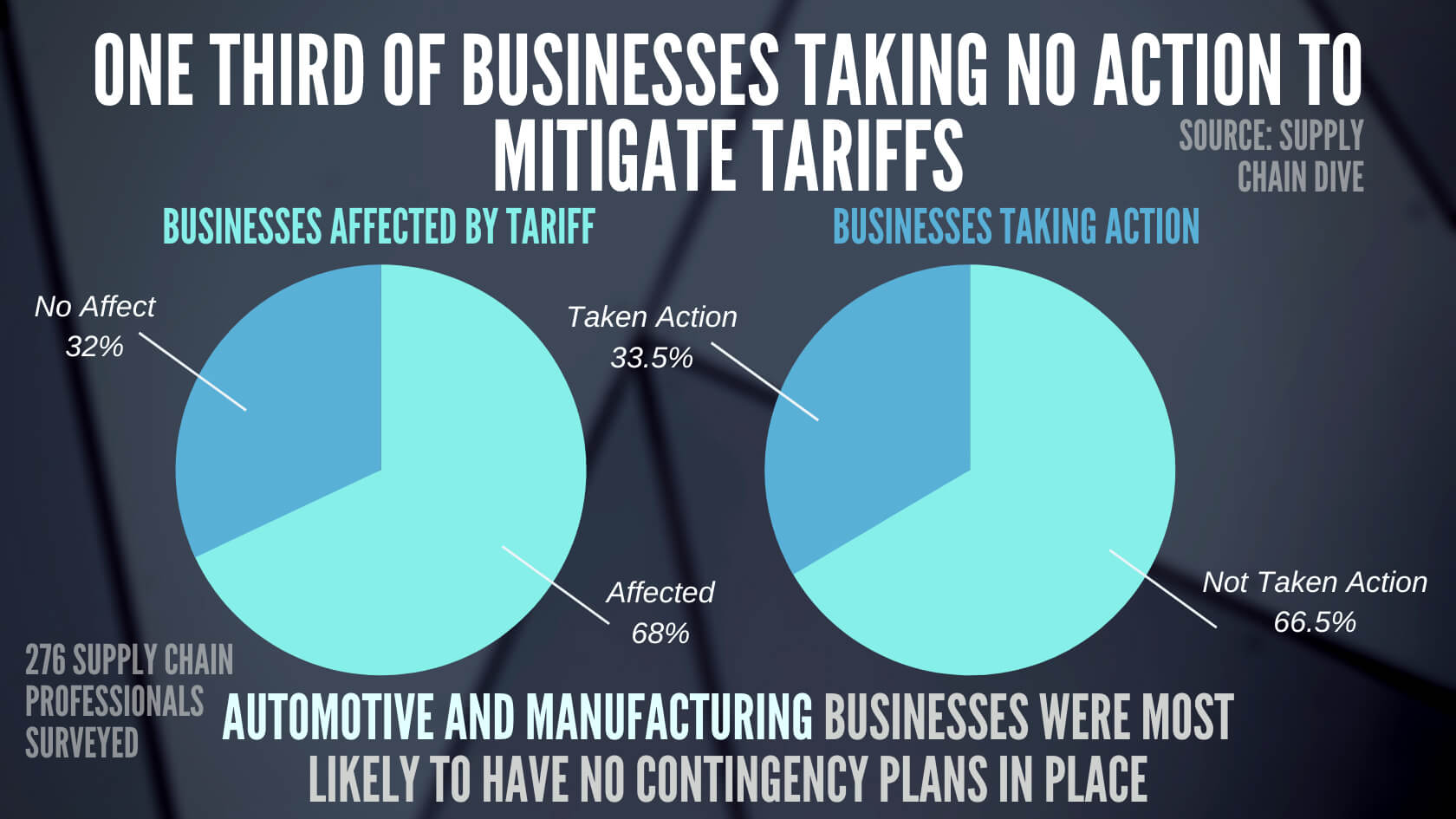
One-Third of Businesses Taking No Action to Mitigate Tariffs
A survey taken within the logistics industry revealed a wide-ranging level of concern and proactivity within the global business network during the ongoing age of tariffs. The survey included responses from 276 supply chain professionals across multiple industries.
Close to 68% of survey respondents reported that their business is somewhat affected, affected, or highly affected by tariffs, leading one to believe that most businesses would take some type of action in response to the tariffs. A smaller number, 29.5% reported being unaffected by them.
Of those 276 professionals, one-third of businesses (33.5%) are taking no action to mitigate tariffs. Additionally, one-quarter have no contingency plans to mitigate risks posed by the U.S. trade war with China. Automotive and manufacturing businesses were most likely to not have a contingency plan in place.
The most common responses to avoid the impact on operations in China are:
- Seeking components and assembly outside of China (20%)
- Applying for tariff exemptions (15.7%)
- Finding alternative sourcing within China (12.8%)
- Shifting production out of China entirely (11.7%)
Some of the respondents (8.3%) reported inaction based on the belief that the tariffs would be removed soon. Only 28.4% of respondents have tariff contingencies planned out beyond a 12-month period and just 4.7% have contingency plans going past the next six months.

Challenges in China Continue
The most consistent aspect throughout the tariff trade war is that doing business in China is becoming more and more difficult as tariffs continue. The report stated the most common issues were:
- An increase in delayed orders
- Less supplier reliability
- Additional work needed to mitigate the short-term impact of tariff escalations
All three common issues could lead to a long-term solution that involves U.S. companies sourcing less from China.
Private companies started to diversify the source of their international goods when the trade war started in 2018, and some started several years ago. Michael Kors, the fashion brand, began shifting away from China nearly five years ago when supply chain managers sensed that rising labor costs would be a continuous problem.
The most common reasons respondents had for moving sourcing out of China were:
- Tariffs (36.1%)
- Market access and regulatory restrictions (21.1%)
- Rising labor costs (19.7%)
Businesses most likely to shift away from sourcing in China include electronics, manufacturing, and consumer product firms. On the other hand, life sciences and healthcare respondents choose not to move production. The difference between industries serves to show that it is difficult to reroute supply chains out of China. This is due to the fact that China is able to meet the many regulatory hurdles and specific expertise that is needed in the field, something that not all countries can provide.
To Relocate, or Not to Relocate
Not all companies have chosen to relocate their supply source as they consider different factors. The top three reasons why respondents (27%) decide not to relocate supply chains are:
- The time and cost required to relocate
- Long-standing relationships
- Companies were not affected by the tariffs
Those that have relocated have turned to several of the same countries as their new source. The top locations for those businesses that do look to move away from China include:
- India
- Vietnam
- European Union
- Mexico
Only 7% of respondents considered moving production from China to the United States. Companies that move outside of China to avoid tariffs should keep in mind that the logistics infrastructure in Southeast Asia, India, and other emerging markets may be less developed when it comes to roads, rail lines, and port conditions.
In addition, those that have shifted sourcing state the biggest challenges as:
- Finding the right source components (20.2%)
- Forging a connection with new suppliers (17.9%)
- Heavy port congestion and shipping costs (11.9%)
Deciding whether or not to relocate business sourcing is a big decision with many possible repercussions, and it’s uncertain at this point which decisions will produce positive or negative effects. Companies can lose money by deciding not to relocate if the tariff trade war continues indefinitely, or they could lose money if they do relocate and the trade war ends soon.
President Trump is still deciding on the Phase One deal with China, which could potentially cause even further tariff tensions between the United States and China.
UPDATE
On December 13th, President Trump reached a decision on the Phase One trade deal. U.S. tariffs on Chinese goods that were scheduled to take effect on December 15th, known as list 4B, will not take effect. The Office of the U.S. Trade Representative (USTR) confirmed the deal in a press release shortly after the President’s announcement.
Additionally, the 15% tariffs that began at the beginning of September will be reduced to 7.5%. The September tariffs were placed on $120 billion worth of goods (list 4A). However, the 25% tariffs will remain the same, from lists one through three, which total $250 billion worth of imports from China.
USTR has stated that as part of the deal, China would make “substantial additional purchases of U.S. goods and services in the coming years.” The type or quantity of goods has not been specified, although President Trump suggested the products would be agricultural, energy, and manufacturing goods. The President also said that negotiations on the Phase Two Deal will begin immediately.
International Transportation with R+L Global Logistics
R+L Global Logistics can meet your international supply chain needs whether you’re shipping to or from China, India, Vietnam, European Union, or Mexico. We offer a wide range of international shipping and logistics services in order to move your goods from point A to point B. Our services include:
- Air Freight
- Customs Brokerage
- Ground
- Import/Export
- Mexico Transborder Services
- Ocean
- Warehousing
Our logistics team has the knowledge, experience, and dedication to best serve you throughout the international shipping process. R+L Global Logistics’s strategic network of commercial partners work to deliver on-time shipments worldwide and satisfy the customer at every turn. Call and speak to one of our team members at 877-510-9133 to get started moving your goods today!
